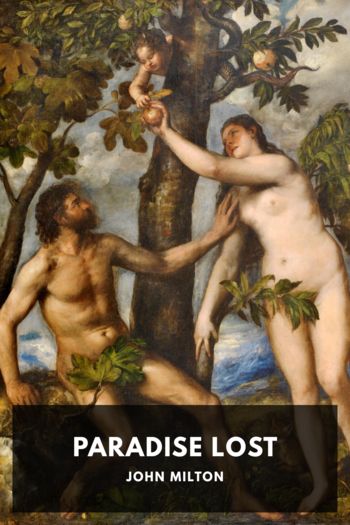Table-Talk by William Hazlitt (best pdf reader for ebooks txt) 📕

- Author: William Hazlitt
Book online «Table-Talk by William Hazlitt (best pdf reader for ebooks txt) 📕». Author William Hazlitt
“That strut and fret their hour upon the stage—”
but of tall phantoms of words, abstractions, genera and species, sweeping clauses, periods that unite the Poles, forced alliterations, astounding antitheses—
“And on their pens Fustian sits plumed.”
If they describe kings and queens, it is an Eastern pageant. The Coronation at either House is nothing to it. We get at four repeated images—a curtain, a throne, a sceptre, and a footstool. These are with them the wardrobe of a lofty imagination; and they turn their servile strains to servile uses. Do we read a description of pictures? It is not a reflection of tones and hues which “nature’s own sweet and cunning hand laid on,” but piles of precious stones, rubies, pearls, emeralds, Golconda’s mines, and all the blazonry of art. Such persons are in fact besotted with words, and their brains are turned with the glittering but empty and sterile phantoms of things. Personifications, capital letters, seas of sunbeams, visions of glory, shining inscriptions, the figures of a transparency, Britannia with her shield, or Hope leaning on an anchor, make up their stock-in-trade. They may be considered as hieroglyphical writers. Images stand out in their minds isolated and important merely in themselves, without any groundwork of feeling—there is no context in their imaginations. Words affect them in the same way, by the mere sound, that is, by their possible, not by their actual application to the subject in hand. They are fascinated by first appearances, and have no sense of consequences. Nothing more is meant by them than meets the ear: they understand or feel nothing more than meets their eye. The web and texture of the universe, and of the heart of man, is a mystery to them: they have no faculty that strikes a chord in unison with it. They cannot get beyond the daubings of fancy, the varnish of sentiment. Objects are not linked to feelings, words to things, but images revolve in splendid mockery, words represent themselves in their strange rhapsodies. The categories of such a mind are pride and ignorance—pride in outside show, to which they sacrifice everything, and ignorance of the true worth and hidden structure both of words and things. With a sovereign contempt for what is familiar and natural, they are the slaves of vulgar affectation—of a routine of high-flown phrases. Scorning to imitate realities, they are unable to invent anything, to strike out one original idea. They are not copyists of nature, it is true; but they are the poorest of all plagiarists, the plagiarists of words. All is farfetched, dear bought, artificial, oriental in subject and allusion; all is mechanical, conventional, vapid, formal, pedantic in style and execution. They startle and confound the understanding of the reader by the remoteness and obscurity of their illustrations; they soothe the ear by the monotony of the same everlasting round of circuitous metaphors. They are the mock-school in poetry and prose. They flounder about between fustian in expression and bathos in sentiment. They tantalise the fancy, but never reach the head nor touch the heart. Their Temple of Fame is like a shadowy structure raised by Dullness to Vanity, or like Cowper’s description of the Empress of Russia’s palace of ice, “as worthless as in show ’twas glittering”—
“It smiled, and it was cold!”
On Effeminacy of CharacterEffeminacy of character arises from a prevalence of the sensibility over the will; or it consists in a want of fortitude to bear pain or to undergo fatigue, however urgent the occasion. We meet with instances of people who cannot lift up a little finger to save themselves from ruin, nor give up the smallest indulgence for the sake of any other person. They cannot put themselves out of their way on any account. No one makes a greater outcry when the day of reckoning comes, or affects greater compassion for the mischiefs they have occasioned; but till the time comes, they feel nothing, they care for nothing. They live in the present moment,





Comments (0)